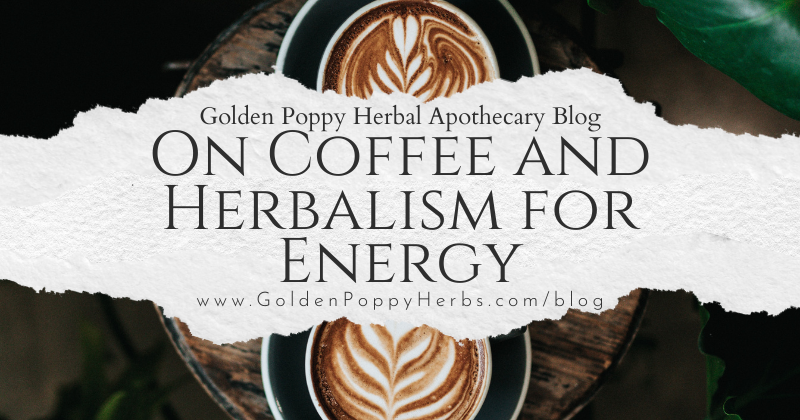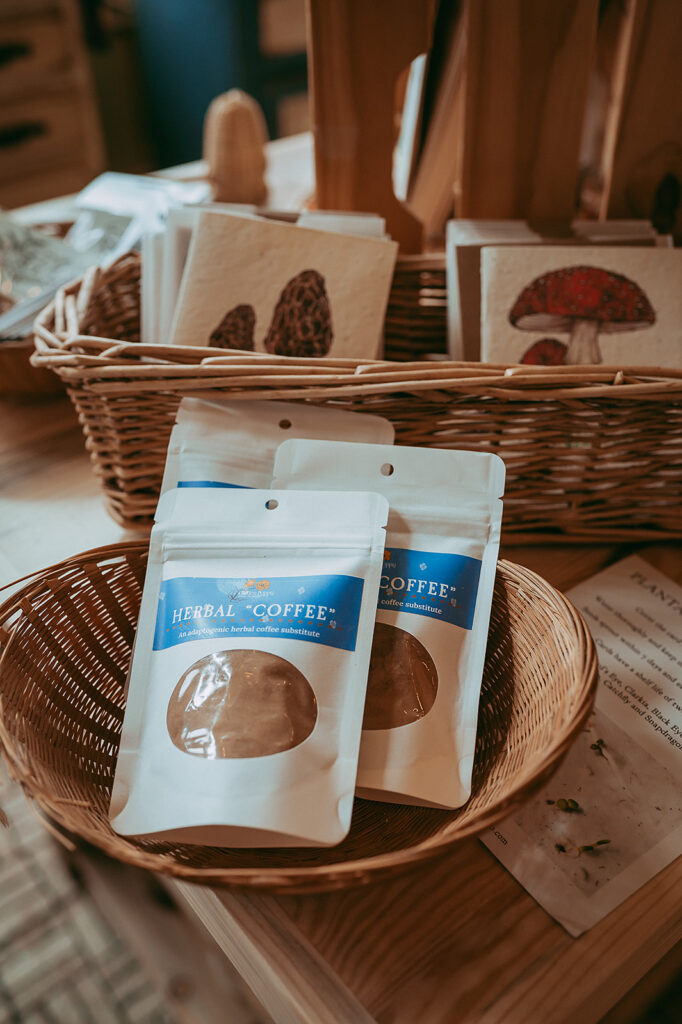 Now, before we begin, this is not a post where we begrudge the cozy, delicious, comforting thing that is a good cup of joe. We get it! Coffee can sometimes be that thing that hits just right when you need it most. It can bring us energy, can be shared in good company, helps us get through those mornings where we just do not want to get out of bed, or even can be enjoyed as an iced refreshment on the hottest summer day. Additionally, according to Johns Hopkins Medicine, there have been studies that have shown (when used in moderation of course), that coffee can actually be beneficial for our health. Some examples include that it may help prevent a weakening heart or heart failure, has been linked to helping to prevent development of conditions like Alzheimers or Parkinsons, and is believed to be supportive for healthy enzyme levels in the liver.
Now, before we begin, this is not a post where we begrudge the cozy, delicious, comforting thing that is a good cup of joe. We get it! Coffee can sometimes be that thing that hits just right when you need it most. It can bring us energy, can be shared in good company, helps us get through those mornings where we just do not want to get out of bed, or even can be enjoyed as an iced refreshment on the hottest summer day. Additionally, according to Johns Hopkins Medicine, there have been studies that have shown (when used in moderation of course), that coffee can actually be beneficial for our health. Some examples include that it may help prevent a weakening heart or heart failure, has been linked to helping to prevent development of conditions like Alzheimers or Parkinsons, and is believed to be supportive for healthy enzyme levels in the liver.
 Photo by Nathan Dumlao on Unsplash[/caption] Coffee is of course packed with caffeine and is incredibly stimulating. While these properties are a huge part of the reason we may love to brew it, it is also important that we are aware of the impact of large amounts of caffeine in our bodies. For example, this can have a negative impact on our nervous systems, as caffeine stimulation increases our levels of alertness and energy levels, which can result in less desired outcomes such as anxiety, depression, and jitteriness in our mind and body. Long-term, this can also impact our sleep cycles, making falling asleep difficult, or even leading to conditions such as insomnia. That said, some of us may simply be more sensitive to the effects of caffeine more than others. The ways in which caffeine impacts our bodies vary, and actually depend on factors such as genetics, whether or not we are taking medication, and amount consumed on a daily basis. The coffee industry also has some significant environmental and human impacts. In Western cultures in particular, coffee tends to be something that is over-utilized and consumed at incredibly high rates (Americans alone drink about 400 million cups a day!). Due to the high demands for coffee, more land is required for production, threatening continued mass deforestation, which is devastating to ecosystems and exacerbates impacts of climate change. Additionally, coffee production is water intensive, requiring approximately 37 gallons to produce 4.2 ounces of coffee, as determined by the Water Footprint Network. The coffee industry also takes a human toil due to the labor that is required, and the fact that it is a relatively unstable economic commodity due to variability such as pests, as well as exacerbated conditions caused by climate change. The coffee industry is also riddled with human rights issues including inequitable pay, forced labor (including child labor), and inhumane working conditions. Now, while we have explored some of the nuances of coffee, including the good and the bad, we want to encourage you and empower you with a few habits that can make coffee work in your favor, and if you feel like you want to find alternatives to coffee altogether, we will explore options for that as well!
Photo by Nathan Dumlao on Unsplash[/caption] Coffee is of course packed with caffeine and is incredibly stimulating. While these properties are a huge part of the reason we may love to brew it, it is also important that we are aware of the impact of large amounts of caffeine in our bodies. For example, this can have a negative impact on our nervous systems, as caffeine stimulation increases our levels of alertness and energy levels, which can result in less desired outcomes such as anxiety, depression, and jitteriness in our mind and body. Long-term, this can also impact our sleep cycles, making falling asleep difficult, or even leading to conditions such as insomnia. That said, some of us may simply be more sensitive to the effects of caffeine more than others. The ways in which caffeine impacts our bodies vary, and actually depend on factors such as genetics, whether or not we are taking medication, and amount consumed on a daily basis. The coffee industry also has some significant environmental and human impacts. In Western cultures in particular, coffee tends to be something that is over-utilized and consumed at incredibly high rates (Americans alone drink about 400 million cups a day!). Due to the high demands for coffee, more land is required for production, threatening continued mass deforestation, which is devastating to ecosystems and exacerbates impacts of climate change. Additionally, coffee production is water intensive, requiring approximately 37 gallons to produce 4.2 ounces of coffee, as determined by the Water Footprint Network. The coffee industry also takes a human toil due to the labor that is required, and the fact that it is a relatively unstable economic commodity due to variability such as pests, as well as exacerbated conditions caused by climate change. The coffee industry is also riddled with human rights issues including inequitable pay, forced labor (including child labor), and inhumane working conditions. Now, while we have explored some of the nuances of coffee, including the good and the bad, we want to encourage you and empower you with a few habits that can make coffee work in your favor, and if you feel like you want to find alternatives to coffee altogether, we will explore options for that as well!
Improve Your Daily Java
1. Purchase Coffee that is Sustainably Produced and Ethically-Sourced
While learning about the negative effects of the coffee industry may be alarming, we have power in choosing how we source the coffee that we consume, and can make choices that are sustainable for the planet and improve the quality of life of the farmers that produce it. Awareness is key, and we can start by educating ourselves on certifications we should look for when making decisions on what brands of coffee to purchase. For example, brands that are Fair Trade Certified ensure that farmers are rightly compensated for their labor and production. Additionally, it is encouraged to research producers that regenerative and sustainable growing practices, such as water conservation, utilizing canopy and shade, and those that protect wildlife. However, it is important to not rely on certification labels alone, and if you want to learn more, the Smithsonian Magazine has a great quick-guide to buying coffee ethically that can help to get you started in the right direction!
 Photo by Niclas Illg on Unsplash[/caption]
Photo by Niclas Illg on Unsplash[/caption]
2. Make it Adaptogenic!
As aforementioned, if we experience things like anxiety, coffee can potentially exacerbate these feelings for us. Nervousness and anxious feelings can also be exacerbated when we are experiencing stress, whether this is caused by situations in our work or personal lives, or as the result of stimulants that exist in our environment. When our nervous system is regulated, we are better able to withstand stressful situations. Adaptogens, or adaptogenic herbs are those that can give our nervous system a boost and help us to overcome and adapt to stress more easily and effectively. An easy way to work with adaptogens is to actually incorporate them into our morning coffee, such as using a reishi powder, or purchasing coffee that is infused with adaptogenic herbs! If you are interested in learning more about adaptogens and how they support our nervous system, check out our previous blog post on the subject!3. Spice it Up!
More often than not, the culprit that is most to blame for negative health impacts is not coffee alone by itself, but the ways in which we might choose to doctor it up. Many of us prefer our coffee with added sugars, sweeteners, or creamers - many of which are packed with preservatives or things that do not contribute to nutritional value such as saturated fats or processed ingredients. We can instead choose to flavor our coffee using beneficial kitchen spices such as cardamom, nutmeg, or cinnamon, which are warming, have antioxidants, and can support our metabolism. You may also choose to make creamers or syrups homemade, which is simple and inexpensive to do, and you are empowered by knowing exactly what ingredients goes into them. Imagine adding your own homemade lavender-infused syrup to your espresso - what a heavenly way to start the day!Herbal Alternatives to Coffee
If you are someone who is curious about alternatives to coffee, perhaps because you want to consume less, or perhaps want to stop drinking it all together, we invite you to explore the herbal options that are available! However, if you are someone who consumes coffee, particularly more than one cup a day on a regular basis, we definitely recommend tapering your coffee consumption slowly, so as to avoid the uncomfortable aspects of caffeine withdrawal, which can include such things as debilitating migraines.Work with Energy-Boosting Herbs
As broadly discussed in this post, many of us enjoy coffee because of its stimulant properties, giving us boosts of energy when we are feeling drained or sleepy. However, there are many herbs that can be energizing just as much as coffee (and often without a “crash” later on in the day!):- Schizandra Berry: This tart herb is known for the “zing” it gives right from the minute it touches our tongue! In Traditional Chinese Medicine (TCM), Schisandra, which is known as the “five-flavor fruit” due to the fact it embodies five different tastes (including being sour and pungent at the same time!), is believed to be supportive to our qi energy, or life force, and works across several meridians of the body.
- Ginseng: Ginseng is an herb that is beneficial for mental stimulation. While energizing, this herb can also promote mental activity and improved ability to focus as well as increased cognitive function.
- Maca: This herb, which has a cozy malt-like flavor, and is often most widely available in powder form, can easily be incorporated into a warm morning beverage such as hot chocolate, or added to a morning smoothie. In addition to the benefit of increased energy, Maca is also an herb that has adaptogenic qualities and is supportive to our nervous system regulation and helping to reduce effects of stress within the body.
- Citrus: If you are someone who would be less inclined to describe themselves as a morning person and struggle with feeling energized first thing in the morning, the citrus family may be a great ally for you! Infusing a glass of water first thing in the morning with fresh lemon juice can help to promote increased energy levels as well as additional benefits such as flushing the liver to start the day. Keeping citrus essential oil rollers to apply to pulse points on the body or smelling salts to breath in the scent of citrus first thing in the morning next to your bed can also be a quick and effective way to feel more awake quickly.
Work with a Root Herb Coffee Alternative Blend
A great herbal hack for getting the same energizing benefits of coffee while also getting benefits such as vitamins and minerals, liver support, and boosting our metabolism is working with the trifecta blend of Dandelion, Burdock, and Chicory root. This may not be an exact dupe for the flavor of coffee, however it has similar qualities and is dark like coffee, especially when the herbs are roasted. You can also spice it up with your favorite herbs to modify the flavor to your liking, or add cream or honey as you would with a regular cup of coffee.Check out our herbal coffee blend: Golden Poppy Herbal Coffee Blend

Opt for Adrenal Cocktails
“Adrenal Cocktails” have gained a lot of popularity both in and out of the wellness community. In our modern culture, many of us tend to experience chronic states of high cortisol levels and stress. Feeling in a constant state of fight-or-flight can ultimately lead to adrenal fatigue, which means that we feel chronically exhausted and can also cause feelings of depression or lethargy. Adrenal cocktails are a quick and easy way to provide nourishment back to our adrenal glands, help to lower cortisol levels in the body, and are incredibly energizing - especially being great for overcoming the afternoon slump many of us are all too familiar with! While there are many recipes online for making an adrenal cocktail, the key components include:- A form of citrus for vitamin C (Lemon juice, grapefruit juice, orange juice, etc)
- Mineral Salt
- A source of electrolytes, such as coconut water
- A healthy fat, such as coconut cream
- A form of protein, such as collagen or protein powder
- Cream of Tartar, for added potassium
- Fair Trade Certified. “Fair Trade Coffees to Start the Day Right.” Fair Trade Certified. 22 December 2020. Retrieved from: https://www.fairtradecertified.org/blog/fair-trade-coffee/?gclid=CjwKCAjwgqejBhBAEiwAuWHioKIKWV0E-iROA-bNdDBPJDW8XtzJiAMkgVyYnyqU0eldOMBCHzZWkRoCfwEQAvD_BwE
- Harvard School of Public Health. “The Nutrition Source: Coffee.” Harvard University. July 2020. Retrieved from: https://www.hsph.harvard.edu/nutritionsource/food-features/coffee/#:~:text=Low%20to%20moderate%20doses%20of,insomnia%2C%20and%20increased%20heart%20rate.
- Healthline. “Schisandra.” Healthline. 11 January 2018. Retrieved from: https://www.healthline.com/health/schisandra#side-effects-and-risks
- Johns Hopkins Medicine. “9 Reasons Why (the Right Amount of) Coffee is Good for You. Johns Hopkins Medicine. 2023. Retrieved from: https://www.hopkinsmedicine.org/health/wellness-and-prevention/9-reasons-why-the-right-amount-of-coffee-is-good-for-you
- Nosowitz, Dan. “A Guide to Buying Ethical Coffee.” Smithsonian Magazine. 25 September 2015. Retrieved from: https://www.smithsonianmag.com/arts-culture/a-guide-buying-ethical-coffee-180956743/
- Perkins, Ceri. “Wonder about the impact of your daily cup of coffee on the planet? Here’s the bitter truth.” TED. 27 July 2022. Retrieved from: https://ideas.ted.com/truth-about-coffee-impact-on-environment-planet/
- Princeton University Health Services. “Caffeine.” Princeton University. 2023. Retrieved from: https://uhs.princeton.edu/health-resources/caffeine



